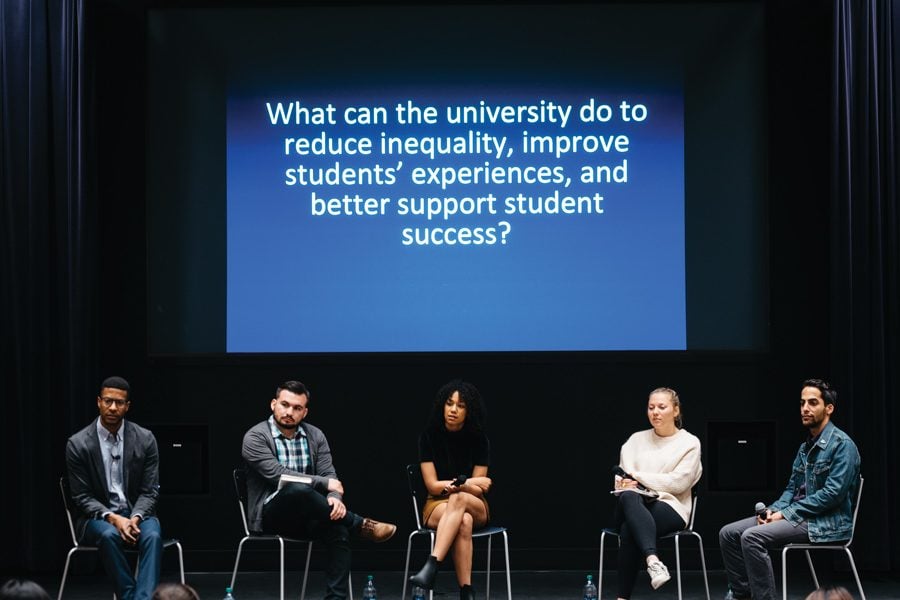Psychology department hosts panel about inequality on campus
Cameron Cook/The Daily Northwestern
Student panelists speak at an event about inequality on campus. The discussion, held by psychology department faculty, was funded by the Provost Awards for Faculty Excellence in Diversity and Equity.
May 8, 2018
During a Tuesday discussion with psychology department faculty, student panelists shared their experiences of inequality on campus and institutional solutions to the issue.
The talk, which attracted approximately 120 people at the McCormick Foundation Center Forum, is the first installment in a series of events held by the psychology department to focus on the psychology of inequality. The series is funded by the Provost Awards for Faculty Excellence in Diversity and Equity, which are provided to faculty members who work to improve inclusion on campus.
First-year graduate student Ivan Hernandez said he first became interested in inequality after being admitted into Northwestern. Until his admission, he said he never realized his struggles –– both social and financial –– as the child of Mexican immigrants were not widely shared experiences.
“When both of my parents worked, I cared for my siblings, and there’s five of us,” he said. “I started working just after I turned 12. But I just thought this was normal, right? It wasn’t until college where I found out that that definitely wasn’t the case.”
Weinberg junior Alexus Snowden said the struggle of having to balance work, academics and a social life is an example of inequality on campus. Students who come from low-income backgrounds may have to choose between spending on books or food, which affects the overall quality of their lives.
Weinberg senior Rafael Alejo added that inequality pervades on campus because experiences are gated by money. Northwestern University Dance Marathon, Ski Trip, Greek life and even $5 student production tickets are all examples of experiences that may exclude students who don’t have the financial means, he said.
“(Greek life is) the most obvious manifestation of high net worth individuals making sure their high net worth son or daughter remains around high net worth sons or daughters,” he said.
As a way to address some inequalities, Weinberg junior Tess Brieva said the University should be more transparent about course costs. Books can be expensive, and students should be able to seek the financial help needed for the courses they want to take, she said.
Hernandez added that efforts have to be made in not only recruiting low-income students but also retaining them. Many students feel that once they’re admitted, they are “abandoned” and left to navigate their identity as low-income students at an affluent university, he said.
He said the University should help students in this transition process, especially by making pre-orientation programs more accessible and free.
“It’s easy to feel like you don’t belong or this university is not meant for you,” he said. “Oftentimes the students ourselves have to create spaces so that we can support each other because they’re nonexistent. Whereas other groups may come in to the university that seems to be catered for them, and the transition is easy.”
Weinberg junior Abby Hodonicky, who attended the event, told The Daily that equality efforts on campus can be inconsistent because opportunities for support are often competitive and further divide students. Scholarships and internship funding only goes to a few people and alienates the rest of the applicants, she said.
She said the event, however, was a positive step toward raising awareness that students with different socioeconomic backgrounds exist on campus.
“Just talking about awareness of it can at least make it so that people can at least assume that not everyone can go out to dinner,” Hodonicky said. “It was encouraging to see the professors listening.”
A previous version of the story misidentified one of the panelists. Weinberg junior Alexus Snowden participated on the panel. The Daily regrets the error.
Email: catherinekim2020@u.northwestern.edu
Twitter: @ck_525



